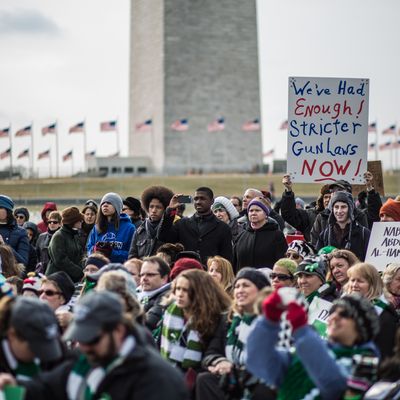
Joe Manchin conceded today that his bill to expand background checks of gun-buyers — a compromise of a compromise, just about the smallest possible policy response to the Sandy Hook massacre — doesn’t have enough votes and is likely to fail. Does that sound crazy? How can a proposal with the support of 90 percent of America, that recently enjoyed the passionate endorsement of the National Rifle Association and its current president get voted down?
The short answer is: because that’s how American politics works. And the background check episode turns out to be a highly useful case study, because it single-handedly debunks many of the things people intuitively believe about our political system. If you were surprised at this result, let me explain why you shouldn’t have been:
1. Getting a majority of America isn’t the same thing as getting a majority in Congress, because Congress doesn’t perfectly represent America. The House represents a collection of districts, the overwhelming majority of which are not competitive and produced a nearly impervious Republican majority despite Democrats receiving more votes in aggregate. The Senate gives vastly disproportionate representation to small states, which are mostly rural (that’s why they’re small) and thus much more pro-gun.
2. Even if you win a majority in the Senate, it isn’t enough. You need 60 votes to break a filibuster. When you combine 1 with 2, you hand a small rural minority overwhelming power.
3. Almost everybody may support background checks, but not every American knows the actual content of every bill that gets a vote. Look at health-care reform. Americans overwhelmingly favor nearly every provision of Obamacare, but oppose the law because they had a general sense of not liking it.
Likewise, opponents have turned the debate into a general discussion of “gun control,” which is way less popular than a specific law about background checks. Lisa Murkowski explains her No vote thusly: “In Alaska you’re pretty much pro-gun. That about sums it up.”
4. Combining 1,2, and 3: Owing to the Republican tilt of the Senate map, Democrats owe their Senate majority to their ability to hold on to a number of seats in heavily Republican states. How do they do that? By signaling cultural affinity with their states’ voters and bucking the party leadership when they can. Maintaining an A record from the National Rifle Association is their best way to do that.
Would you like to be the red state Democrat explaining to voters that your B+ grade on guns is only because you supported criminal background checks? I wouldn’t.
Also, once it looked likely that the House might either weaken or kill any Senate bill, the incentive for Senate Democrats stick their neck out dwindled to almost nothing. In that sense, the Republican lock on the House map helped dictate the behavior of the Senate.
5. Presidential leadership doesn’t matter. “Leadership” has always been the pundit formula for summoning some kind of alchemy to transform the merciless logic of Congressional incentives. But presidential leadership does not work. Presidents merely polarize the debate. They don’t change anybody’s mind.
Remember President Obama’s amazing post-Newtown address? The one everybody called the best of his presidency? Didn’t matter. Neither did the series of follow-up speeches, the mobilizing of Newtown parents, or the rest.
6. The good news? Our political system is still way better than North Korea’s.






























